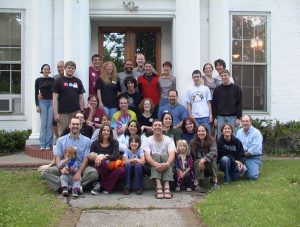Daniel Quinn died over a year ago, but it doesn't feel too late to offer up some remembrances and tributes to the many ways he made a difference in my life, and the lives of so many others.
Quinn's novel Ishmael, and the lifetime of study, contemplation, research and thinking that led up to it, is at the center of his impact, at least for me. In critically examining the most fundamental stories our culture tells itself about our origins, our purpose and our place in the world, Ishmael and subsequent books from Quinn provided a new framework of understanding and exploration about how human society works, and could work.
It would be over-simplifying to say that it is a novel about environmentalism and sustainability, or uncovering cultural biases, or problematic religious traditions, or human potential and selfishness, although it is deeply about all of those things. For me personally, reading it was a ground-shaking event in my college years, both because it named feelings, experiences, certainties and doubts I already had inside me, and then introduced a slew of new ones that I had to work through. That I am probably still working through. Whereas some novels have to invent a plot device that provides a dramatic twist at the end -- the ancient secret society DOES exist and the magical stone was hidden behind the painting all along! -- in Ishmael all of the secrets that are uncovered are real, buried in our cultural history and traditions, and the implications for revealing them are far reaching in how we live our lives.
As a person, Quinn was not a pushy evangelist for his ideas, nor did have a neatly packaged solution to offer up for the many challenges his books highlighted. Yes, he spent a lifetime trying (along with his wife Rennie) to make his ideas more clear, more accessible, more actionable through giving lectures, engaging with his readers and their questions, traveling to events and facilitating connections between those who were inspired by his work. But he wasn't selling, he wasn't anybody's savior, and his emphasis was always on improving our thinking and what might come from that.
I do not claim to have known Dan very well, but every time I talked with him or saw him in person, I experienced him as a grounded, authentic, kind, and intensely intelligent person. He had a contemplative nature, and I always appreciated that when asked a question about his work or his ideas, he would listen carefully and then pause for as long as he needed to provide a thoughtful, intentional answer. If he didn't know or couldn't form a useful response, he just said so. He was keenly aware of the power of words to persuade, convince, change minds and alter the course of history, and so he also seemed wary of uttering something that could be misinterpreted, re-appropriated or used to stuff his very not-mainstream ways of thinking into a comfortable mainstream box. He didn't have much patience for people who weren't trying to think for themselves or learn from past mistakes.
Because of the power of his books, many people wanted Dan to be their leader: the leader of their movement or their project or their personal journey through the world, or all of the above. I was always careful about not worshipping Dan himself or of not elevating his writing as sacred texts. But I guess I did help to start a group of people and a series of events centered around his work that jokingly referred to ourselves as a "cult of Ishmael" -- sorry, Dan. 🙂
That group and those events were called IshCon.
So many people who encountered Quinn's work found themselves asking the question, "what do I do now!?" In the summer of 1999 the Internet had evolved to the point where people with obscure interests could find each other online with relative ease, and in my own search for meaning and action, I found a guy named Tony. He suggested that we have a conference to discuss the ideas in Ishmael, and without knowing him that well or exactly what he had in mind, I said, "great, let's do it."
We found a small conference center in my town, picked some dates, emailed a few hundred people, and waited for the spaces to fill up. By the time our registration cut-off came, we had 30 people signed up from six different states. We established an e-mail discussion list so that everyone could get to know each other a little bit before coming together, and it was instantly getting tons of messages per day, abuzz with introductions, questions, and energy. And most everyone seemed perfectly comfortable sending their registration fees to two strangers in the name of having the opportunity to get together and just be with others who had these ideas tossing around in their heads. The realization that there was such a thirst for this kind of event encouraged us and inspired us further in our planning.
The thirst and excitement carried on right through the event itself. As people began to arrive and check in, there was an instant sense of camaraderie among these strangers. Rushed conversations trying to get it all out, exclamations of “It’s so cool to be here with someone that understands that!”, smiles and laughs and warm welcomes. Tony and I had been nervous about how this was going to go, but when we started to get the feeling that we could just leave matters to themselves for the next day and a half and everyone would be fine, we felt much more comfortable. A college professor. A resident of an eco-village. A musician. A customer liaison at a large corporation. A high school student. A biologist. A minister. A website developer. A teacher. A college student. Farmers. A cook. A computer programmer. A adult movie producer. newspaper editor. Teenagers. Twentysomethings. Fiftysomethings. Men. Women. Single people. Married couples. Mother and son.
We had some variety there. And this was, I think, representative of the universal appeal of Quinn's work, cutting across so many of the boundaries that might typically divide us.
We talked together for two days straight. We talked in large groups, small groups, over meals, on walks through the woods, late into the night. We tried to make sense of what we'd experienced in encountering Ishmael and what changes were being prompted within us. I'm sure some folks felt a sense of progress, some felt a sense of connection, and some were itching for more. But at the end we sat in a circle in the sun and offered our gratitude for the time together.

Days after the conference had ended, the e-mail mailing list resumed with fervor. From those discussions and from the connections that resulted, there would be several more IshCon conferences and events over the years to come. Some of the same faces returned but we also had new people each time, and each gathering was special and different in its own way. Some were in conference centers, some were camping and celebrations of "the outdoors," some were just gatherings in people's homes and yards. Groups in different parts of the country started organizing their own versions. Daniel Quinn himself was able to call in to or attend a few of those. I'm sure there were plenty of events I had no knowledge of.
There was a lot of idealism here. But through these gatherings, I personally found a deep sense of belonging, of having located my "tribe" and the kinds of interactions that fed me intellectually and spiritually like nothing else in my life at the time. I found friends, I found mentors, and I found love.
As the events carried on, I saw the need to keep "the conversation" going in between. In 2002 I added an online forum section to the IshCon.org website I'd set up for the conferences, and the email list discussions moved there. The conversation exploded, mostly in good ways. There were thousands of threads, some with many hundreds of thoughtful, helpful replies. As an online discussion space it developed its own culture and norms, sometimes self-imposed, sometimes through moderation by trusted elders in the community. For many it was a source of continued exploration, reflection and challenge to see what could be done with, or as a result of, Daniel Quinn's writing. Like many of the online forum experiences of the early 2000s, we collectively spent many, many hours "together" there, and learned a lot along the way.
Also like many online forum experiences of the time, when the community grows to a certain size, or when not enough care and attention is given to keeping the conversation respectful and productive, or when the passion for seemingly conflicting ideas creates actual conflict, a divergence occurs and the community can fracture. That happened in the case of IshCon, though how dramatic or uncomfortable it was probably depends on who you ask. It was clear that this particular experiment in online community was reaching its end, and in 2007 the forums because an archive.
It was not the end of the conversation, and certainly nowhere near the end of Quinn's influence. For me personally, that influence and his framework for questioning assumptions and reframing an issue have continued in running a business, campaigning for elected office, building community in my town, and finding clarity about who I am and what I can do in my life. More broadly, I continue to see places where his writing, ideas and thinking has influenced the world around me. That moment of realization that you're talking with someone inspired by Quinn's work is always still a special one.
I also see more places than ever where his influence is still needed, parts of our culture where we are unable or unwilling to confront the problems with basic premises we're working from about our place in the world. Between escalating degradation of the environment, climate change, continued devaluing of both human and non-human forms of life, and a political culture that puts an historically strong emphasis on lifting up the wealthiest among us at any cost, it's hard to see our civilization as anything other than worse off than it was when Quinn started his writing. Searching for hope and progress within that by continuing to change minds and take action may be the hardest thing Quinn's Ishmael has asked us to do, but do it we must.
There have been other books and other authors who have challenged me in profound ways. There have been lectures and travel experiences and college classes and conversational moments that have turned my thinking on its head. But I can say that no other single writer, thinker or series of books has transformed me so directly and deeply as Daniel Quinn and his writing did. He made me a better thinker, and hopefully a better person.
So I celebrate his life, his work, the sparks he made, the fires he set burning, and his many lasting contributions to our world. Thank you, Dan.
Image of Daniel Quinn from the Artery. Parts of this post are adapted from my essay, "An Earnest Desire: Reflections on Ishmael, IshCon, and Saving the World," previously published on the IshCon.org website in June 2003.
 I’m a journalist, publisher, software developer and entrepreneur with experience as a founder and organizational leader. Work with me or learn more about me.
I’m a journalist, publisher, software developer and entrepreneur with experience as a founder and organizational leader. Work with me or learn more about me.

Thanks for sharing some of your "how I got to be who I am" story!